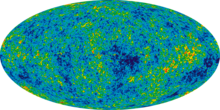| Part of a series on |
| Physical cosmology |
|---|
 |
The Big Bounce hypothesis is a cosmological model for the origin of the known universe. It was originally suggested as a phase of the cyclic model or oscillatory universe interpretation of the Big Bang, where the first cosmological event was the result of the collapse of a previous universe.[1][2][3][4] It receded from serious consideration in the early 1980s after inflation theory emerged as a solution to the horizon problem, which had arisen from advances in observations revealing the large-scale structure of the universe.
Inflation was found to be inevitably eternal, creating an infinity of different universes with typically different properties, suggesting that the properties of the observable universe are a matter of chance.[5] An alternative concept that included a Big Bounce was conceived as a predictive and falsifiable possible solution to the horizon problem.[6] Investigation continued as of 2022.[7][8][9][10]
- ^ Abelev, B.; Adam, J.; Adamová, D.; Aggarwal, M. M.; Aglieri Rinella, G.; Agnello, M.; Agostinelli, A.; Agrawal, N.; Ahammed, Z.; Ahmad, N.; Ahmed, I.; Ahn, S. U.; Ahn, S. A.; Aimo, I.; Aiola, S. (2014-11-10). "Beauty production in pp collisions at s=2.76 TeV measured via semi-electronic decays" (PDF). Physics Letters B. 738: 97–108. doi:10.1016/j.physletb.2014.09.026. ISSN 0370-2693. S2CID 119489459.
- ^ Novello, M.; Bergliaffa, S. E. Perez (2008-07-01). "Bouncing cosmologies". Physics Reports. 463 (4): 127–213. arXiv:0802.1634. Bibcode:2008PhR...463..127N. doi:10.1016/j.physrep.2008.04.006. ISSN 0370-1573. S2CID 119274449.
- ^ Finelli, Fabio; Brandenberger, Robert (2002-05-15). "Generation of a scale-invariant spectrum of adiabatic fluctuations in cosmological models with a contracting phase". Physical Review D. 65 (10): 103522. arXiv:hep-th/0112249. Bibcode:2002PhRvD..65j3522F. doi:10.1103/PhysRevD.65.103522. S2CID 7262222.
- ^ Ashtekar, Abhay; Pawlowski, Tomasz; Singh, Parampreet (2 October 2006). "Quantum nature of the big bang: Improved dynamics". Physical Review D. 74 (8): 084003. arXiv:gr-qc/0607039. Bibcode:2006PhRvD..74h4003A. doi:10.1103/PhysRevD.74.084003. S2CID 34651070.
- ^ McKee, Maggie (25 September 2014). "Ingenious: Paul J. Steinhardt – The Princeton physicist on what's wrong with inflation theory and his view of the Big Bang". Nautilus. No. 17. NautilusThink Inc. Archived from the original on 23 January 2017. Retrieved 31 March 2017.
- ^ Steinhardt, Paul J.; Turok, Neil (2005). "The cyclic model simplified". New Astronomy Reviews. 49 (2–6): 43–57. arXiv:astro-ph/0404480. Bibcode:2005NewAR..49...43S. doi:10.1016/j.newar.2005.01.003. ISSN 1387-6473. S2CID 16034194.
- ^ Ijjas, Anna; Steinhardt, Paul J. (January 10, 2022). "Entropy, black holes, and the new cyclic universe". Physics Letters B. 824: 136823. arXiv:2108.07101. Bibcode:2022PhLB..82436823I. doi:10.1016/j.physletb.2021.136823.
- ^ Wood, Charlie (August 4, 2020). "Big Bounce Simulations Challenge the Big Bang". Quanta Magazine.
- ^ Lehners, Jean-Luc; Steinhardt, Paul J. (2013). "Planck 2013 results support the cyclic universe". Physical Review D. 87 (12): 123533. arXiv:1304.3122. Bibcode:2013PhRvD..87l3533L. doi:10.1103/PhysRevD.87.123533. ISSN 1550-7998. S2CID 76656473.
- ^ Brandenberger, Robert; Peter, Patrick (2017). "Bouncing Cosmologies: Progress and Problems". Foundations of Physics. 47 (6): 797–850. arXiv:1603.05834. Bibcode:2017FoPh...47..797B. doi:10.1007/s10701-016-0057-0. ISSN 0015-9018. S2CID 118847768.